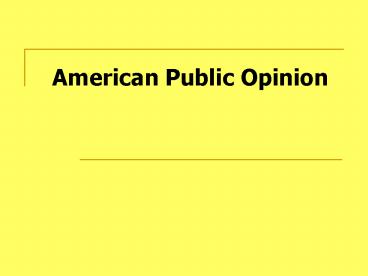American Public Opinion - PowerPoint PPT Presentation
1 / 16
Title:
American Public Opinion
Description:
What Shapes Public Opinion? ... a.) limited political information/knowledge among the public ... the boundaries of what the public is willing to support/oppose ... – PowerPoint PPT presentation
Number of Views:449
Avg rating:3.0/5.0
Title: American Public Opinion
1
American Public Opinion
2
What is Public Opinion?
- ? the aggregate set of individual political
opinions, attitudes, and preferences of the
adult population on matters of relevance to
government (Bob Erikson and Kent Tedin)
3
What Shapes Public Opinion?
- Political Socialization ? the life-long learning
of political values, beliefs, and attitudes - Sources of Public Opinion
- 1. Social Institutions
- a.) Family
- b.) Religion
- c.) Educational Institutions
- d.) Media
- e.) Generational Effects
- f.) Life-cycle Effects
4
More Sources of Public Opinion
- 2.) Race/Ethnicity
- 3.) Gender
- 4.) Political Ideology/Partisanship
- 5.) Conscious, Strategic Choice based on
Experience and Self-Interest - 6.) Innate Predispositions/Tendencies
5
Education is Correlated with Political Knowledge
6
Education is Correlated with Tolerance
7
Socio-Demographic Group Differences
8
Diversity Variety Different Attributes
Associated with Different Opinions
9
Black-White Differential Attitudes over Race
Relations and Policy
10
Ordinary Folks are Less Ideological than Elites
11
The Art and Science of Public Opinion
- 1.) Measurement of Public Opinion
- a.) measurement has improved over time
- b.) increased demand and increased supply of
surveys and polls - 2.) A penny for your thought?
- a.) limited political information/knowledge
among the public - b.) unstable, inconsistent individual opinions
- c.) ideological-elites and nonideological-masses
- d.) cognitive biases and other issues
- 3. Difference between aggregate and individual
public opinion
12
Americans Limited Political Sophistication
13
The PolicyPublic Opinion Connection
- 1.) Cannot really use polls/surveys to directly
govern - a.) public opinion may lack clarity
- b.) difficult to truly know where the public
stands - c.) no easy way to translate poll results into
actual policies - 2.) There may be an eventual alignment between
public opinion and public policy - 3.) Nevertheless, public opinion nourishes
democracy
14
Policy Preferences of the Public (1952-2000)
15
What is the Political Usefulness of Polls?
- 1.) To understand/know what the public thinks
- 2.) To know the boundaries of what the public is
willing to support/oppose - 3.) To better market policy proposals
- 4.) To make public officials more responsive
- 5.) To educate/inform the public
- 6.) To add greater legitimacy and credibility to
what government does or does not do - 7.) To try to advance nefarious purposes
16
Things to Keep in Mind About Polls
- 1. Know What is the Purpose of a Poll and Who is
conducting it - 2. What questions are asked and How they are
asked matters - 3. Context of a Survey/Polls Administration
Makes a Difference - 4. Understand Key Components (e.g. who are
included in the sample of respondents how were
they selected) of a Poll - 5. Evaluating the Results
- a.) Affected by how results are presented
- b.) Keep a careful perspective (e.g. do not
overestimate) - c.) Realize that uncertainty cannot be eliminated





![⚡Read✔[PDF] The Real American Dilemma: Race, Immigration, and the Future of America PowerPoint PPT Presentation](https://s3.amazonaws.com/images.powershow.com/10048492.th0.jpg?_=20240605043)



![[PDF] Essentials of Health Policy and Law (Essential Public Health) 4th Edition Kindle PowerPoint PPT Presentation](https://s3.amazonaws.com/images.powershow.com/10079287.th0.jpg?_=20240716062)





















